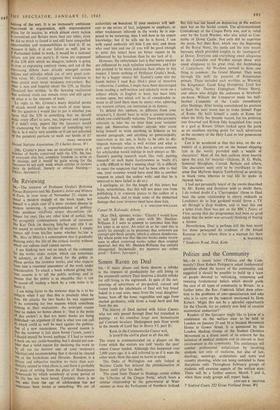Simon Raven on Deal
SIR.---If many places and firms deserve a rebuke in the interests of productivity for still living in the nineteenth century Deal deserves a double rebuke for still living in the eighteenth. In spite of the out- pourings of advertisers of pre-packed, canned and frozen foods the inhabitants of Deal still buy bread baked in a coal oven, meat from the local slaughter- house, ham off the bone, vegetables and eggs from market gardeners, milk from a local herd and fish from the sea.
The history of Deal started with Julius Caesar, who not only passed through Deal but remarked in passing: ex his omnibus lunge snot humanissimi qui Cantium incolunt. Shakespeare puts these words in the mouth of Lord Say in Henry V/, part II:
Kent, in the Commentaries Caesar writ, Is term'd the civil'st place in all this isle.
The event is commemorated on a plaque on the front which the visitors are told 'marks the spot' where Caesar landed. Although this happened over 2,000 years ago, it is still referred to as if it we the other week. Now this must be borne in mind.
The Duke of Wellington not only lodged at Walmer Castle but delayed the philistinisation of Dover until after his death.
The coast from Thanet to Hastings comes within the 'Liberties of the Cinque Ports,' which bears a similar relationship to the government at West- minster as does the Parliament of Northern Ireland. But this was not based on democracy or the welfare state but on the feudal system. The aforementioned
Confederacy of the Cinque Ports was, and is, ruled over by the Lord Warden, who also acted as Con- stable of Dover Castle. Not only did he supervise the ports, but their fleet, which was the beginning of the Royal Navy, the castle and the nine tenant baronies which provided knights to do 'castleguard' at Dover. Everyone and everything owed allegiance to the Constable and Warden except those who owed allegiance to his great rival, the Archbishop of Canterbury. All Wardens seemed to have one thing in common: the Grand Manner. They went through life with the panache of Renaissance princes. These included such worthies as Warwick the Kingmaker, Good King Humphrey, Lord .Say (above)„ Sir Thomas Erpingham, Prince Henry, and others who delight the audiences at Stratford- on-Avon. William the Conqueror made his half- brother Constable of the Castle immediately after Hastings. After having consolidated his position in Kent his next move was to make himself Pope of Rome. He built himself a castle at Rome for when the Holy See became vacant, but his ambition was thwarted and Bishop Odo languished four years in a gaol at Rouen. Others looked upon the ports as an excellent starting point for such adventures as the recovery of the Holy Land or lost possessions in France.
Can it be wondered at that this area, on the ex- tremity of a peninsula yet on the busiest shipping lane in the world, provided such a wealth of characters? Most of the best authors drew heavily upon the area for material—Dickens, H. G. Wells, Somerset MaUgham, Conrad, Barham and others. The characters seem only to be overdrawn in the sense that Marlowe depicts Tamburlaine as speaking in blank verse whereas in real life he spoke in rhymed verse.
1 had not personally heard of the events described by Mr. Raven and therefore tend to doubt them.
I do indeed doubt if a 'Clierrypicker (those in Deal bear the same relationship to cherry orchards as Londoners do to hop gardens) would throw a TV
set through a shop window, and to bear this out a letter from Deal was put on the BBC's Points of View saying th'at the programmes had been so good lately that the writer was seriously thinking of buying a licence.
Nevertheless, Deal is perhaps still the best resort for those persecuted by creditors of the Inland Revenue or for whom there is a warrant for their
arrest. R. WAKERELL 7 Sundown Road, Deal, Kent






































 Previous page
Previous page